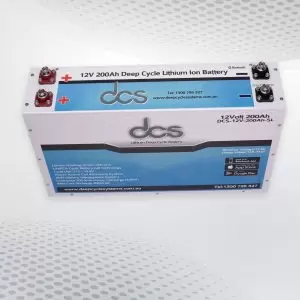Solar energy is becoming an increasingly popular and environmentally friendly option for powering homes and businesses. However, one of the challenges with solar energy is its intermittency – the sun doesn’t always shine, and therefore, the energy generated by solar panels is not always available for use. This is where deep cycle batteries come in. These specialized batteries are designed to store solar energy for later use, maximizing your investment in solar power and providing a reliable source of electricity even when the sun isn’t shining. In this blog post, we will explore the benefits of Deep Cycle Battery for solar energy systems and how they can help you get the most out of your solar investment.
Understanding the Basics of a Deep-Cycle Solar Battery
Deep-cycle solar batteries are an essential component of solar energy systems, but many people may not fully understand their basics. So, let’s dive in and demystify these crucial power storage devices.
Unlike standard car batteries, deep-cycle batteries are designed to discharge power slowly over an extended period. They can withstand multiple cycles of charging and discharging without significant degradation, making them perfect for storing and utilizing solar energy.
Deep-cycle batteries are typically made of lead-acid or lithium-ion and come in various sizes and capacities to meet different energy needs. They have thicker plates that can withstand deeper discharges, ensuring a more extended and reliable power supply.
One crucial aspect to consider is the battery’s ampere-hour (Ah) rating, which indicates the battery’s capacity. A higher Ah rating means the battery can store more energy. Additionally, understanding the battery’s voltage is important for connecting it to your solar power system correctly.
To prolong the lifespan of a deep-cycle solar battery, it’s crucial to prevent overcharging or discharging it too much. This can be achieved by using a charge controller and monitoring the battery’s state of charge regularly.
Why a Deep-Cycle Battery is Vital for your Solar Energy System
Solar energy is a fantastic way to power your home or business while reducing your carbon footprint. However, the intermittent nature of solar power can be a challenge. That’s where deep-cycle batteries come in, providing a vital solution to this problem.
Deep-cycle batteries are specifically designed to store the excess energy generated by your solar panels when the sun is shining. This stored energy can then be used when the sun isn’t out or during times of high energy demand. This means you can have a reliable and continuous power supply, even when the sun isn’t shining.
The importance of deep-cycle batteries for your solar energy system cannot be overstated. By having a battery backup, you can reduce your reliance on the grid and have a sustainable source of electricity. This not only helps you save money but also gives you peace of mind knowing that you will have power even during outages or periods of low solar generation.
How to Optimize Your Solar Power with a Deep-Cycle Battery
To optimize your solar power system with a deep-cycle battery, there are a few key strategies you can implement.
First, it’s important to properly size your deep-cycle battery. This involves determining your energy needs and selecting a battery with enough capacity to meet those demands. Consider factors such as your average daily energy consumption, the maximum number of consecutive days without sunlight, and any anticipated increases in energy usage in the future.
Next, take advantage of time-of-use (TOU) rates offered by utility companies. These rates vary based on the time of day and can be significantly cheaper during off-peak hours. By charging your deep-cycle battery during low-cost periods and using the stored energy during high-cost periods, you can save money on your energy bill.
Additionally, consider implementing energy-efficient practices in your home or business. This can include using energy-saving appliances, installing LED lighting, and optimizing the energy usage of your HVAC system. By reducing your overall energy consumption, you can maximize the efficiency of your solar power system and decrease your reliance on the deep-cycle battery.
Tips to Maximize Lifespan and Performance of a Deep-Cycle Battery
To ensure the longevity and optimal performance of your deep-cycle battery, here are some essential tips to follow:
- . Proper Charging and Discharging: Avoid overcharging or fully discharging your deep-cycle battery. This can lead to reduced lifespan and capacity. Use a charge controller to prevent overcharging, and aim to keep the battery’s state of charge between 50% and 80%.
- Regular Maintenance: Regularly inspect your battery for any signs of damage or wear. Clean the battery terminals and ensure they are tight and free from corrosion. This helps maintain good electrical conductivity and extends the life of the battery.
- Temperature Control: Deep-cycle batteries perform best within a specific temperature range. Extreme heat or cold can affect their performance and lifespan. If possible, store and operate your battery in a temperature-controlled environment.
- Avoid Deep Discharges: While deep-cycle batteries are designed for deep discharges, it’s still beneficial to avoid extreme depths of discharge whenever possible. Shallow discharges and regular recharging can help prolong battery life.
- Equalizing Charge: Periodically perform an equalizing charge on your deep-cycle battery. This process helps balance the cells and ensure consistent performance across the battery.
- Avoid Mixing Batteries: If you need to expand your solar power system, avoid mixing different types or ages of batteries. This can lead to imbalances and reduce the overall efficiency of the system.
Common Mistakes to Avoid with Deep Cycle Solar Batteries
When it comes to deep-cycle solar batteries, there are some common mistakes that people often make. By being aware of these mistakes and taking steps to avoid them, you can ensure that your deep-cycle battery operates at its best and lasts for as long as possible.
One of the most common mistakes is not properly sizing the battery for your solar energy system. It’s important to determine your energy needs and select a battery with enough capacity to meet those demands. Choosing a battery that is too small can lead to insufficient energy storage while selecting one that is too large can be a waste of resources and money.
Another mistake is neglecting regular maintenance and care for the battery. Just like any other piece of equipment, deep-cycle batteries require attention and upkeep. Failure to clean the battery terminals, check for damage, and monitor the state of charge can result in reduced performance and a shorter lifespan.
Additionally, overcharging or fully discharging the battery is a mistake that should be avoided. This can lead to degradation of the battery’s capacity and overall lifespan. Using a charge controller and keeping the state of charge between 50% and 80% can help prevent these issues.
Maintaining and Caring for Your Deep-Cycle Solar Battery
Maintaining and caring for your deep-cycle solar battery is crucial to ensure its longevity and optimal performance. By following a few simple steps, you can extend the lifespan of your battery and maximize its efficiency.
First and foremost, it’s important to regularly inspect your battery for any signs of damage or wear. Check the battery terminals for corrosion and ensure they are tight and clean. This will help maintain good electrical conductivity and prevent any potential issues.
Additionally, monitor the state of charge of your deep-cycle battery regularly. Avoid overcharging or fully discharging the battery, as this can lead to reduced capacity and a shorter lifespan. Utilize a charge controller to prevent overcharging and aim to keep the battery’s state of charge between 50% and 80%.
Temperature control is also crucial for the performance and lifespan of your battery. Extreme heat or cold can affect the battery’s efficiency, so if possible, store and operate it in a temperature-controlled environment.
Another important tip is to avoid deep discharges whenever possible. While deep-cycle batteries are designed for deep discharges, it’s still beneficial to avoid extreme depths of discharge. Shallow discharges and regular recharging can help prolong the battery’s life.
The Importance of Choosing the Right Deep Cycle Solar Battery
Choosing the right deep-cycle solar battery is crucial for the success and efficiency of your solar energy system. While all deep cycle batteries are designed to store and release energy, not all batteries are created equal. The battery you choose will directly impact the performance, lifespan, and overall reliability of your system.
One important factor to consider is the battery’s capacity. This is measured in ampere-hours (Ah) and indicates how much energy the battery can store. Choosing a battery with a higher Ah rating ensures that you have enough stored energy to meet your needs, especially during periods of low solar generation or high energy demand.
Another factor to consider is the battery’s voltage. It’s essential to choose a battery with a voltage that matches your solar power system. This ensures compatibility and efficient energy transfer between the battery and the rest of your system.
Additionally, you should consider the type of Deep Cycle Solar Battery technology. While lead-acid batteries are more affordable, lithium-ion batteries offer higher energy density, longer lifespan, and better efficiency. Understanding the pros and cons of each technology will help you make an informed decision.
FAQs
Q: Can I use a regular car battery as a deep cycle battery?
A: No, regular car batteries are not designed for deep cycling and will not perform well in a solar energy system. Deep cycle batteries have thicker plates and are built to handle the repetitive charging and discharging required for solar storage.
Q: How do I choose the right size deep-cycle battery for my solar energy system?
A: To determine the right battery size, you need to consider your daily energy consumption, the number of days without sunlight, and any future energy needs. Consulting with a solar energy professional can help you determine the optimal battery size for your system.
Q: Do I need a charge controller for my deep-cycle battery?
A: Yes, a charge controller is crucial for protecting your deep-cycle battery from overcharging. It regulates the voltage and current flowing to the battery, ensuring optimal charging and extending the battery’s lifespan.
Q: Can I connect multiple deep-cycle batteries?
A: Yes, you can connect multiple deep cycle batteries in parallel or series to increase storage capacity or voltage, respectively. However, it’s essential to ensure that all batteries are of the same type, age, and capacity for optimal performance.
Conclusion
In conclusion, deep-cycle batteries are an essential component of a solar energy system, allowing you to maximize your solar investment. These batteries store solar energy for later use, ensuring a reliable power source even when the sun isn’t shining. By properly sizing your battery, optimizing your energy usage, and following maintenance tips, you can prolong the lifespan and performance of your deep-cycle battery. Remember to choose the right battery for your needs, and consult with a professional to ensure compatibility with your solar power system. With a deep cycle battery, you can enjoy the benefits of solar energy all year round.










